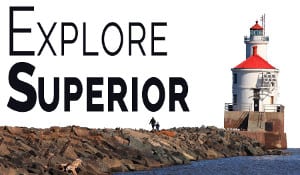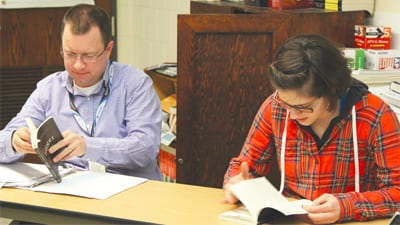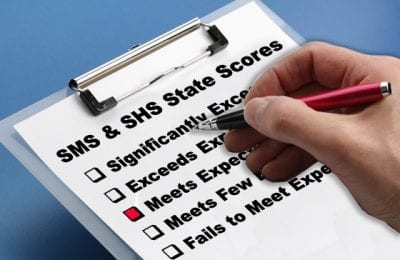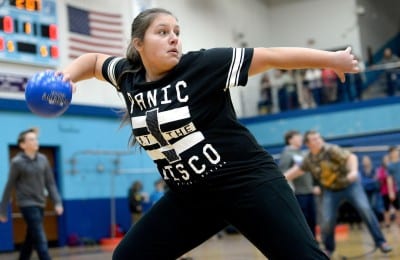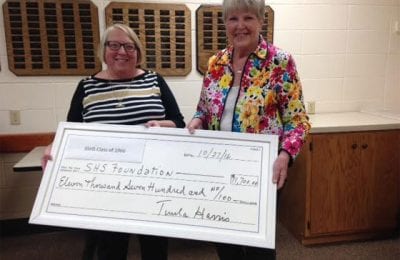High School Classrooms Tackle Racial Relations (Part 1)

Senior Makalia Young says that she has been called “nigger.” Classes have been studying racial relaions and the struggle for equity throughout history. Photo by Creede McClellan
By Creede McClellan | SHS Spartan Spin
In this time after the deaths of Michael Brown and Eric Garner, two African Americans that were killed in 2014 by police officers, discussions and protests about racial relations have occurred across the country. Even locally, these discussions have been seen. According to an article, “We should be working together,’” printed in the Duluth News Tribune on Feb. 24, the Black Student Union and the Latina Americana group at the University of Wisconsin-Superior held a forum called “It’s Time to Talk” on Feb. 23. During the event, police officers and minority students met to discuss issues of racial relations.
With the discussion of racial relations on the rise, our staff wanted to look at how racial relations play a part in our high school. While racial relations impact students in the halls, at home and in the community, we focused on the classroom. We reached out to all SHS staff through email to see if racial relations play a role in their classes. We heard back from the teachers of 12 classes, as well as the school psychologist.
To publish all aspects of racial relations in our classrooms, we will be splitting this story into a two-part series. Part 1 will include Advanced Senior Social Science, American Government, World History and Advanced Placement World History.
Advanced Senior Social Science

Advanced Senior Social Science teacher Kyle Smith (left) sits beside senior Megan Tunell while skimming through “Nigger: The Strange Career of a Troublesome Word” by Randall Kennedy on Feb. 20 in Room 235. Photo illustration by Creede McClellan
The Advanced Senior Social Science class read the book “Nigger: The Strange Career of a Troublesome Word” by Randall Kennedy. The book describes the history and controversy over the racially-charged word. It also addresses different perspectives on racism, racial relations and the lives of African Americans.
Kyle Smith teaches the Advanced Senior Social Science class, a critical thinking course in which students study major works of literature in a seminar atmosphere.
“Many years ago, we were looking at the things we could do with seniors. It was decided to bring this book in by Kennedy to Senior Social,” Smith said.
Senior Maggie Dahl, a white student, is taking Advanced Senior Social Science and has learned that sensitivity can be felt when dealing with the n-word, which was adopted as a derogatory term used by white slave owners towards their slaves. She stated that learning about racial relations is essential to understanding history, as well as our world today.
“It is like if you took out the entire section of slavery in American history and just pushed it away. And then you have nothing. It’s a giant part of American history,” Dahl said.
During class, students learn about issues including why the word can be offensive, why it may seem wrong for white people to say it and where it originated from. Some students refer to the word as the n-word, while other students say the word itself while discussing it in class.
“It is uncomfortable,” Dahl said. “I can see where some people say it doesn’t have the same connotations as it used to, but I think it still can.”
Dahl said that discussing the n-word and saying it in class feels awkward to her because she has grown up knowing it as a harsh, derogatory word that should not be used.
American Government
 The semester-long American Government classes taught by Marc Campbell also studied and read parts of “Nigger: The Strange Career of a Troublesome Word” by Randall Kennedy. In the course, students identify and analyze social issues, including racism, by reading sections of the book.
The semester-long American Government classes taught by Marc Campbell also studied and read parts of “Nigger: The Strange Career of a Troublesome Word” by Randall Kennedy. In the course, students identify and analyze social issues, including racism, by reading sections of the book.
“I started using the book because it went in connection with our unit on free speech, the discussion of hate speech and whether or not words should be banned,” Campbell said.
The high school has a very small population of African American students and Campbell describes it as “living in a bubble.” While some African American students in Campbell’s class will listen to the class lessons and discussions, but not involve themselves, others have a different reaction.
“Some students have been very involved and outspoken and having that first-hand knowledge makes a difference. I encourage them to share their personal experiences because, as white students, many will never understand the other side to it,” Campbell said.
Senior Makalia Young, a black student, took American Government last semester. Young has been called the n-word both in the hallways and outside of school and is uncertain about what people are implying when they use the n-word.
“It makes me wonder,” Young said. “Are they doing it out of honesty or is it really just a joke?”
Young lived in Halls, Tenn., for three years of her life and remembers feeling more tension between Caucasians and African Americans than she does in Superior.
She recalls a road in Halls that African American people, both children and adults, would not cross. On the far side of the road lived Caucasian families that had verbally assaulted many African American people.
“You would see the Confederate flag hanging on people’s houses, and I knew that there was hate directed towards people of my skin color,” Young said.
Alumna (2015) Willow Wilkerling, a black student who graduated last semester, read sections of the book in American Government class last semester. While studying the book, some of her fellow classmates asked if the word affects her. Wilkerling said that she just brushes it off.
“It doesn’t define me as a person. For example, if someone were to call me a [n-word], in my opinion, a [n-word] is someone who is lazy, who doesn’t work. I’m not that person,” Wilkerling said.
World History and AP World History
 Students in all history classes learn about how racial relations have affected the people of the past. In Advanced Placement World History and World History, sophomores learn about some of the earliest forms of racism and racial relations. For example, the Xing dynasty in China treated the people of the Ming dynasty, whom they had conquered, unfairly. The people of the two dynasties were not allowed to intermarry, and Ming people had strict rules on what clothes they wore and how they cut their hair.
Students in all history classes learn about how racial relations have affected the people of the past. In Advanced Placement World History and World History, sophomores learn about some of the earliest forms of racism and racial relations. For example, the Xing dynasty in China treated the people of the Ming dynasty, whom they had conquered, unfairly. The people of the two dynasties were not allowed to intermarry, and Ming people had strict rules on what clothes they wore and how they cut their hair.
AP World History and World History teacher, Chad Postal, recently finished a unit on the African slave trade in his AP World History classes.
“When they’re reading and listening about the first-hand accounts of slaves that endured that process, they’re horrified that other humans could be treated that way,” Postal said.
Sophomore Jack Radtke, a student in AP World History, tries to keep an educational perspective on some of the more disturbing class content.
“When you start to think about how different ethnicities and religions were treated back then, it really cuts deep,” Radtke said.
This article will be continued in a subsequent edition of the Spartan Spin, the student newspaper of Superior High School. When that edition is published at the end of next month, Explore Superior will post that article here as well, and link back to this article.
